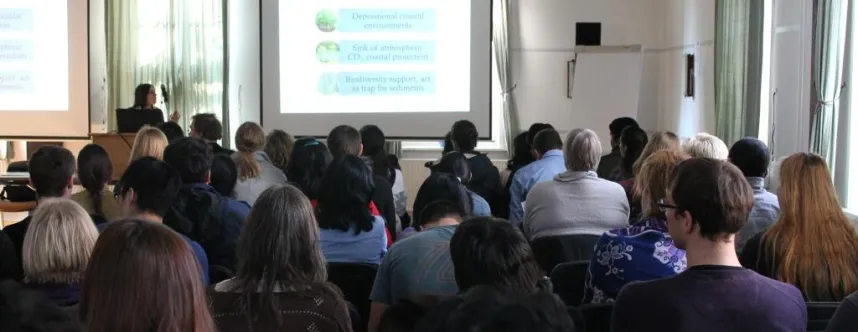Molife Research Seminar Dr. Balder Lai
Exploring HLA-associated drug hypersensitivity using molecular modelling and docking.
Abstract: Small molecules, like drugs, can affect the peptide repertoire presented by a HLA-protein, resulting in severe hypersensitivity. Recently, the structural mechanism of the altered self-peptide repertoire leading to hypersensitivity was confirmed by three crystal structures of HLA-B*57:01 in complex with peptide and the anti-HIV drug, abacavir. Additionally, statistical genetics has also linked specific HLA-alleles to drug hypersensitivity. Our current work investigates the ability of molecular modelling and docking to reproduce these observations and included a test case, flucloxacillin, of which no crystal structures are available. The unique association of either drug to HLA-B*57:01 could be confirmed by molecular docking of the drug molecules to pMHC crystal structures available in the Protein Data Bank. We also investigated the effect of different anchoring residues at the C-terminal end of the peptide on molecular docking results. This work is a first step towards in silico prediction of potential HLA-associated drug hypersensitivity.
Further Info:
Speaker: Dr. Balder Lai, University Medical Center Utrecht, The Netherlands
Host: Prof. Dr. Sebastian Springer, Professor of Biochemistry and Cell Biology - Focus Area: Health - Life Sciences & Chemistry - Email: s.springer@jacobs-university.de - Tel: +49 421 200-3243 - Link to Homepage: http://www.jacobs-university.de/ses/sspringer
Event details and reservation
13.10.2015
Dr. Balder Lai Sebastian Springer University of Utrecht
Exploring HLA-associated drug hypersensitivity using molecular modelling and docking.
Abstract: Small molecules, like drugs, can affect the peptide repertoire presented by a HLA-protein, resulting in severe hypersensitivity. Recently, the structural mechanism of the altered self-peptide repertoire leading to hypersensitivity was confirmed by three crystal structures of HLA-B*57:01 in complex with peptide and the anti-HIV drug, abacavir. Additionally, statistical genetics has also linked specific HLA-alleles to drug hypersensitivity. Our current work investigates the ability of molecular modelling and docking to reproduce these observations and included a test case, flucloxacillin, of which no crystal structures are available. The unique association of either drug to HLA-B*57:01 could be confirmed by molecular docking of the drug molecules to pMHC crystal structures available in the Protein Data Bank. We also investigated the effect of different anchoring residues at the C-terminal end of the peptide on molecular docking results. This work is a first step towards in silico prediction of potential HLA-associated drug hypersensitivity.
Dr. Balder Lai Sebastian Springer University of Utrecht
Exploring HLA-associated drug hypersensitivity using molecular modelling and docking.
Abstract: Small molecules, like drugs, can affect the peptide repertoire presented by a HLA-protein, resulting in severe hypersensitivity. Recently, the structural mechanism of the altered self-peptide repertoire leading to hypersensitivity was confirmed by three crystal structures of HLA-B*57:01 in complex with peptide and the anti-HIV drug, abacavir. Additionally, statistical genetics has also linked specific HLA-alleles to drug hypersensitivity. Our current work investigates the ability of molecular modelling and docking to reproduce these observations and included a test case, flucloxacillin, of which no crystal structures are available. The unique association of either drug to HLA-B*57:01 could be confirmed by molecular docking of the drug molecules to pMHC crystal structures available in the Protein Data Bank. We also investigated the effect of different anchoring residues at the C-terminal end of the peptide on molecular docking results. This work is a first step towards in silico prediction of potential HLA-associated drug hypersensitivity.
Date
Location
Lecture Hall Research II
